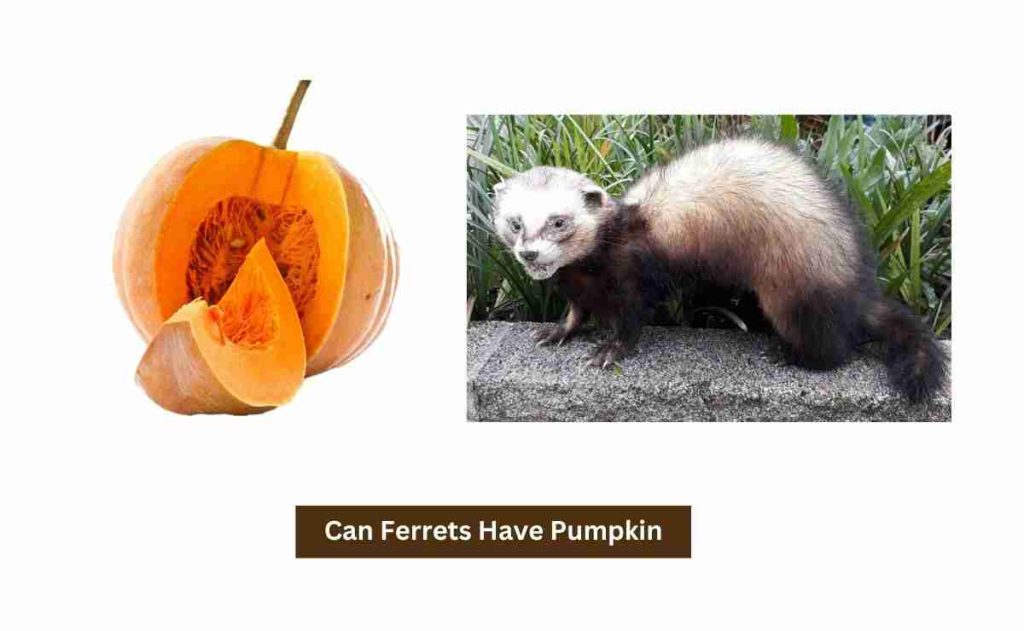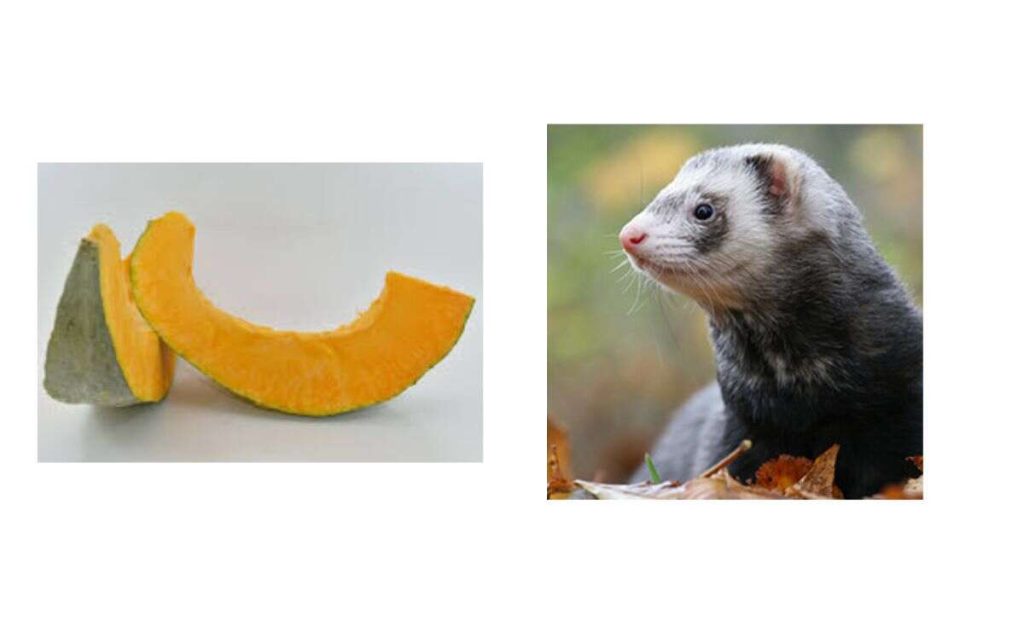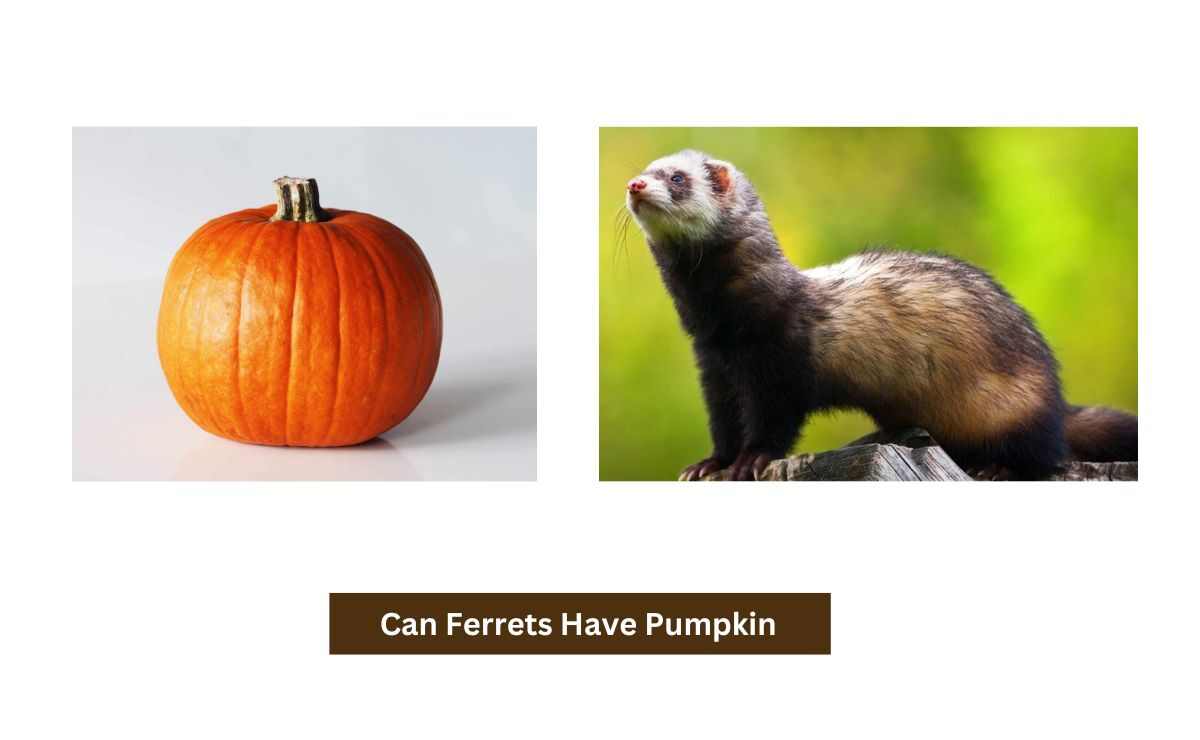Ferrets are adorable and playful exotic pets. They need a balanced and nutritious diet to have an energetic life. However, pet owners try to add something new to their regular diet and often ask if ferrets can have pumpkin.
The quick answer is yes, you can give pumpkins to your ferrets. But there are a few restrictions that you should maintain. Try to give canned pumpkins to them and ensure it is preservative-free. Give plain pumpkins without any additives or species.
Many want to give pumpkin pie filling but it contains sugar and other elements that are not suitable for your ferrets. There are also a few considerations that we will discuss in the below section.
Can Ferrets Have Pumpkin?

Pumpkins are safe for ferrets but only in small portions. When ferrets are at a very young age and just started eating solid food, you can give them pumpkins as a treat or supplement. Though adult ferrets can also eat pumpkins when they have some digestive issues like loose stool.
Ferrets are small creatures and their digestive system is pretty fragile. They can only consume meat foods. In their natural habitat, ferrets primarily feed on small mammals like rabbits, mice, rats, and various rodents.
However, being opportunistic hunters, they may also consume a variety of other species, including fish, birds, reptiles, and occasionally insects.
So as carnivores, vegetables, and fruits shouldn’t be provided to ferrets. Since pumpkins are a sort of vegetable or fruit, they can’t be a regular diet. Yet, you can feed pumpkins to your ferrets occasionally.
Benefits Of Eating Pumpkin For Ferrets
While pumpkin can be beneficial to ferrets as an occasional treat, their main diet should be a balanced and nutritionally complete one. However, there are a few benefits of having pumpkins for ferrets.
Pumpkin plays a vital role in binding loose stools. This can be incredibly helpful during gastrointestinal distress, preventing issues such as prolapses, dehydration, and explosive diarrhea.
In some cases, pumpkins can help push along small foreign bodies or bezoars in the digestive tract. However, it’s essential to understand that it’s not a substitute for proper veterinary care in cases of serious blockages.
It’s important to note that while pumpkin can be a digestive savior for ferrets, it should not replace their primary diet. Ferrets have unique dietary requirements, and their main food should consist of high-quality meat products.
When considering additional foods for your ferret, it’s crucial to be aware of what’s safe and what’s not. Some foods can be tough for ferrets to digest and may lead to digestive upset.
When offering pumpkin to your ferret, opt for plain canned pumpkin without any additives or spices. This ensures that your ferret receives the full benefits without any potential harm.
Is Pumpkin Safe for Ferrets?
Pumpkins have lots of good stuff like vitamins, minerals, and fiber. These things are great for people, but for ferrets, it’s a bit different.
Ferrets like to eat foods that are high in protein and low in fiber. Pumpkin doesn’t fit this preference because it has a lot of fiber, which can be hard for ferrets to digest.
Ferrets are made to eat meat, and pumpkin doesn’t have enough of the right kind of protein for them.
If ferrets eat too much pumpkin, it can cause problems in their digestion, like getting things stuck in their guts, which is bad.
Pumpkin also has a lot of sugar. Eating too much sugar can make ferrets fat and might give them health problems like insulinoma, which is something they don’t want.
Plus, the mix of not enough protein and too much cellulose (the stuff that makes plants tough) in pumpkin can be tough on a ferret’s tummy that’s used to having lots of animal protein.
But, there’s a tiny bit of good news. If your ferret is feeling stuck in the tummy and can’t poop, a little bit of pumpkin might help because it has fiber. But only do this if your vet says it’s okay.
Most of the time, it’s better to give your ferret food that’s made just for them. This way, you can be sure they’re getting what they need to stay healthy and happy.
How Do You Feed Pumpkin To A Ferret?

Pumpkin comes in various forms, from raw to cooked, frozen to canned, and even pumpkin pie and pumpkin seeds. Let’s see which of these pumpkin forms are suitable for ferrets.
Raw Pumpkin
Ferrets should avoid raw pumpkin. The tough plant fibers in raw pumpkins can be challenging for their digestive tracts and may lead to blockages. It’s ironic because feeding raw pumpkins to resolve a blockage issue could worsen the situation.
Due to the short digestive tract of ferrets, which is typical of carnivores, they struggle to process the tough fibers in raw pumpkins.
Cooked Pumpkin
Cooked pumpkin is a better option for ferrets. Cooking softens the tough plant fibers in pumpkin, making it easier for ferrets to digest. It reduces the risk of internal blockages caused by the fibrous nature of raw pumpkins. When giving pumpkin to ferrets, it’s essential to avoid adding seasonings like salt or spices.
Canned Pumpkin
Canned pumpkin is also safe for ferrets as long as it’s 100% pure and plain, without any added seasonings or flavors. It’s often used in ferret care, particularly in dealing with situations like blockages or loose stool.
However, it should be given in small quantities, typically measured in tablespoons, and should not become a regular part of their diet.
Frozen Pumpkin
If the pumpkin is frozen raw, it should be cooked before feeding it to ferrets to soften the tough plant fibers. If it was frozen after cooking, you can give it to your ferret. But you need to thaw it first before offering it to your ferret in small quantities.
Pumpkin Pie
Pumpkin pie is not a suitable choice for ferrets. It often contains seasonings and ingredients that can be potentially harmful to them.
While giving a small slice occasionally might not cause immediate harm, routinely feeding your ferret pumpkin pie can lead to problems in the long run.
Pumpkin Seeds
Ferrets should avoid pumpkin seeds as they can be potentially toxic and may also cause blockages due to their size and toughness.
How Much Pumpkin Should I Give The Ferret?
Since ferrets are small creatures and pumpkin is not part of their regular diet, you should provide a very small amount of pumpkins. Probably, you can offer approximately 1/4 to 1/2 teaspoon per day.
A valuable tip to keep in mind is the color of the stool. If you notice the stools turning orange, it’s a signal that you might be providing too much pumpkin. This visual cue allows you to adjust the quantity accordingly. However, if you ever have uncertainties or notice changes in your ferret’s health, you should consult with your veterinarian.
Conclusion
When feeding pumpkin to your ferret is not too harmful, you should maintain some precautions. For example, ensure it is well-cooked to soften the tough fibers. Measure the pumpkin using a tablespoon and combine it in their regular feeding dish.
In emergency situations, such as when dealing with blockages, try to feed smashed pumpkin to your ferret.
